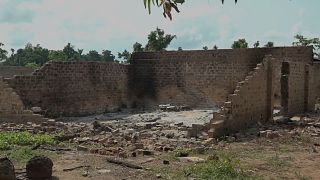Nigeria
The kidnapping of 287 grade school students by gunmen in northwestern Nigeria this week was only the latest in a slew of such raids since the infamous Chibok schoolgirls’ abduction by the Islamic militant group Boko Haram a decade ago.
Around 1,500 students have been kidnapped in raids since 2014.
The kidnappings have taken place in the country’s troubled northern region, where relentless violence by separatist Islamic militant organizations and by bandit groups with no particular ideology have crumbled communities and killed thousands of people.
The abductions generally are aimed at obtaining ransom and have become a lucrative business, according to Shehu Sani, a former federal lawmaker from Kaduna, where the kidnapping occurred on Thursday.
Schoolchildren are targeted because the bandits know "that if they attack schools and kidnap pupils, there would be pressure mounted on the government to negotiate with them and huge sums of money have already been paid to them, which they use to acquire more weapons and kidnap more people,” Sani said.
The government does not admit it, but sources close to the negotiations say ransom payments are made by both families and state governments, Sani said.
Ransom payments and other illicit incomes, such as proceeds from seized farms and mines, have helped the gangs amass a huge arsenal of weapons strong enough to even down military planes.
The abduction of the 287 children in Kaduna state on Thursday, near the West African nation's capital, was one of the largest school kidnappings in the decade since the kidnapping of schoolgirls in Borno state’s Chibok village in 2014.
Analysts and activists say the security lapses that allowed that mass abduction remain.
The victims of the latest attack — among them at least 100 children aged 12 or under — were surrounded and marched into a forest just as they were starting the school day, said locals in Kuriga town, located 55 miles (89 kilometers) from the city of Kaduna.
One man was shot dead as he tried to save the students, school authorities said.
No group has claimed responsibility for the attacks but locals blamed it on the bandits who carry out frequent mass killings and abductions for huge ransoms in remote villages across Nigeria’s northwest and central regions
Nnamdi Obasi, an advisor at Brussels-based International Crisis Group, said the willingness of desperate families, embattled communities and even the state governments to pay ransoms has “turned mass kidnapping into arguably the most lucrative criminal enterprise in the northwest zone.”
Affected communities often are in remote rural locations where the government is largely absent, making them vulnerable to attacks from bandits based in nearby forests.











02:37
Amnesty International denounces lack of investigation into activists' abduction
01:07
At least 120 children abducted by Al Shabab in northern Mozambique, HRW says
Go to video
Boko Haram kidnaps Nigerian Priest near Cameroon border
Go to video
Congo's opposition leader kidnapped in Brazzaville
Go to video
A US pastor abducted in South Africa has been rescued after a police shootout
Go to video
South African Woman on Trial for Kidnapping, Selling Daughter